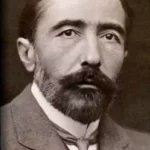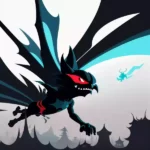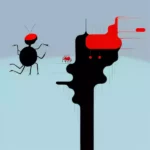 | |
The Inn of the Two Witches – A Find | |
| Author | Joseph Conrad |
|---|---|
| Published |
1886
|
| Language | English |
| Nationality | British, Polish |
| Genre | Adventure, Psychological Fiction |
1886 Short Story
The Inn of the Two Witches – A Find
The Inn of the Two Witches – A Find is an English Adventure, Psychological Fiction short story by British, Polish writer Joseph Conrad. It was first published in 1886.
The Inn of the Two Witches – A Find
by Joseph Conrad
This tale, episode, experience–call it how you will–was related in the fifties of the last century by a man who, by his own confession, was sixty years old at the time. Sixty is not a bad age–unless in perspective, when no doubt it is contemplated by the majority of us with mixed feelings. It is a calm age; the game is practically over by then; and standing aside one begins to remember with a certain vividness what a fine fellow one used to be. I have observed that, by an amiable attention of Providence, most people at sixty begin to take a romantic view of themselves. Their very failures exhale a charm of peculiar potency. And indeed the hopes of the future are a fine company to live with, exquisite forms, fascinating if you like, but–so to speak–naked, stripped for a run. The robes of glamour are luckily the property of the immovable past which, without them, would sit, a shivery sort of thing, under the gathering shadows.
I suppose it was the romanticism of growing age which set our man to relate his experience for his own satisfaction or for the wonder of his posterity. It could not have been for his glory, because the experience was simply that of an abominable fright–terror he calls it. You would have guessed that the relation alluded to in the very first lines was in writing.
This writing constitutes the Find declared in the sub-title. The title itself is my own contrivance, (can’t call it invention), and has the merit of veracity. We will be concerned with an inn here. As to the witches that’s merely a conventional expression, and we must take our man’s word for it that it fits the case.
The Find was made in a box of books bought in London, in a street which no longer exists, from a second-hand bookseller in the last stage of decay. As to the books themselves they were at least twentieth-hand, and on inspection turned out not worth the very small sum of money I disbursed. It might have been some premonition of that fact which made me say: “But I must have the box too.” The decayed bookseller assented by the careless, tragic gesture of a man already doomed to extinction.
A litter of loose pages at the bottom of the box excited my curiosity but faintly. The close, neat, regular handwriting was not attractive at first sight. But in one place the statement that in A.D. 1813 the writer was twenty-two years old caught my eye. Two and twenty is an interesting age in which one is easily reckless and easily frightened; the faculty of reflection being weak and the power of imagination strong.
In another place the phrase: “At night we stood in again,” arrested my languid attention, because it was a sea phrase. “Let’s see what it is all about,” I thought, without excitement.
Oh! but it was a dull-faced MS., each line resembling every other line in their close-set and regular order. It was like the drone of a monotonous voice. A treatise on sugar-refining (the dreariest subject I can think of) could have been given a more lively appearance. “In A.D. 1813, I was twenty-two years old,” he begins earnestly and goes on with every appearance of calm, horrible industry. Don’t imagine, however, that there is anything archaic in my find. Diabolic ingenuity in invention though as old as the world is by no means a lost art. Look at the telephones for shattering the little peace of mind given to us in this world, or at the machine guns for letting with dispatch life out of our bodies. Now-a-days any blear-eyed old witch if only strong enough to turn an insignificant little handle could lay low a hundred young men of twenty in the twinkling of an eye.
If this isn’t progress! . . . Why immense! We have moved on, and so you must expect to meet here a certain naiveness of contrivance and simplicity of aim appertaining to the remote epoch. And of course no motoring tourist can hope to find such an inn anywhere, now. This one, the one of the title, was situated in Spain. That much I discovered only from internal evidence, because a good many pages of that relation were missing–perhaps not a great misfortune after all. The writer seemed to have entered into a most elaborate detail of the why and wherefore of his presence on that coast– presumably the north coast of Spain. His experience has nothing to do with the sea, though. As far as I can make it out, he was an officer on board a sloop-of-war. There’s nothing strange in that. At all stages of the long Peninsular campaign many of our men-of- war of the smaller kind were cruising off the north coast of Spain- -as risky and disagreeable a station as can be well imagined.
It looks as though that ship of his had had some special service to perform. A careful explanation of all the circumstances was to be expected from our man, only, as I’ve said, some of his pages (good tough paper too) were missing: gone in covers for jampots or in wadding for the fowling-pieces of his irreverent posterity. But it is to be seen clearly that communication with the shore and even the sending of messengers inland was part of her service, either to obtain intelligence from or to transmit orders or advice to patriotic Spaniards, guerilleros or secret juntas of the province. Something of the sort. All this can be only inferred from the preserved scraps of his conscientious writing.
Next we come upon the panegyric of a very fine sailor, a member of the ship’s company, having the rating of the captain’s coxswain. He was known on board as Cuba Tom; not because he was Cuban however; he was indeed the best type of a genuine British tar of that time, and a man-of-war’s man for years. He came by the name on account of some wonderful adventures he had in that island in his young days, adventures which were the favourite subject of the yarns he was in the habit of spinning to his shipmates of an evening on the forecastle head. He was intelligent, very strong, and of proved courage. Incidentally we are told, so exact is our narrator, that Tom had the finest pigtail for thickness and length of any man in the Navy. This appendage, much cared for and sheathed tightly in a porpoise skin, hung half way down his broad back to the great admiration of all beholders and to the great envy of some.
Our young officer dwells on the manly qualities of Cuba Tom with something like affection. This sort of relation between officer and man was not then very rare. A youngster on joining the service was put under the charge of a trustworthy seaman, who slung his first hammock for him and often later on became a sort of humble friend to the junior officer. The narrator on joining the sloop had found this man on board after some years of separation. There is something touching in the warm pleasure he remembers and records at this meeting with the professional mentor of his boyhood.
We discover then that, no Spaniard being forthcoming for the service, this worthy seaman with the unique pigtail and a very high character for courage and steadiness had been selected as messenger for one of these missions inland which have been mentioned. His preparations were not elaborate. One gloomy autumn morning the sloop ran close to a shallow cove where a landing could be made on that iron-bound shore. A boat was lowered, and pulled in with Tom Corbin (Cuba Tom) perched in the bow, and our young man (Mr. Edgar Byrne was his name on this earth which knows him no more) sitting in the stern sheets.
A few inhabitants of a hamlet, whose grey stone houses could be seen a hundred yards or so up a deep ravine, had come down to the shore and watched the approach of the boat. The two Englishmen leaped ashore. Either from dullness or astonishment the peasants gave no greeting, and only fell back in silence.
Mr. Byrne had made up his mind to see Tom Corbin started fairly on his way. He looked round at the heavy surprised faces.
“There isn’t much to get out of them,” he said. “Let us walk up to the village. There will be a wine shop for sure where we may find somebody more promising to talk to and get some information from.”
“Aye, aye, sir,” said Tom falling into step behind his officer. “A bit of palaver as to courses and distances can do no harm; I crossed the broadest part of Cuba by the help of my tongue tho’ knowing far less Spanish than I do now. As they say themselves it was ‘four words and no more’ with me, that time when I got left behind on shore by the Blanche, frigate.”
He made light of what was before him, which was but a day’s journey into the mountains. It is true that there was a full day’s journey before striking the mountain path, but that was nothing for a man who had crossed the island of Cuba on his two legs, and with no more than four words of the language to begin with.
The officer and the man were walking now on a thick sodden bed of dead leaves, which the peasants thereabouts accumulate in the streets of their villages to rot during the winter for field manure. Turning his head Mr. Byrne perceived that the whole male population of the hamlet was following them on the noiseless springy carpet. Women stared from the doors of the houses and the children had apparently gone into hiding. The village knew the ship by sight, afar off, but no stranger had landed on that spot perhaps for a hundred years or more. The cocked hat of Mr. Byrne, the bushy whiskers and the enormous pigtail of the sailor, filled them with mute wonder. They pressed behind the two Englishmen staring like those islanders discovered by Captain Cook in the South Seas.
It was then that Byrne had his first glimpse of the little cloaked man in a yellow hat. Faded and dingy as it was, this covering for his head made him noticeable.
The entrance to the wine shop was like a rough hole in a wall of flints. The owner was the only person who was not in the street, for he came out from the darkness at the back where the inflated forms of wine skins hung on nails could be vaguely distinguished. He was a tall, one-eyed Asturian with scrubby, hollow cheeks; a grave expression of countenance contrasted enigmatically with the roaming restlessness of his solitary eye. On learning that the matter in hand was the sending on his way of that English mariner toward a certain Gonzales in the mountains, he closed his good eye for a moment as if in meditation. Then opened it, very lively again.
“Possibly, possibly. It could be done.”
A friendly murmur arose in the group in the doorway at the name of Gonzales, the local leader against the French. Inquiring as to the safety of the road Byrne was glad to learn that no troops of that nation had been seen in the neighbourhood for months. Not the smallest little detachment of these impious polizones. While giving these answers the owner of the wine-shop busied himself in drawing into an earthenware jug some wine which he set before the heretic English, pocketing with grave abstraction the small piece of money the officer threw upon the table in recognition of the unwritten law that none may enter a wine-shop without buying drink. His eye was in constant motion as if it were trying to do the work of the two; but when Byrne made inquiries as to the possibility of hiring a mule, it became immovably fixed in the direction of the door which was closely besieged by the curious. In front of them, just within the threshold, the little man in the large cloak and yellow hat had taken his stand. He was a diminutive person, a mere homunculus, Byrne describes him, in a ridiculously mysterious, yet assertive attitude, a corner of his cloak thrown cavalierly over his left shoulder, muffling his chin and mouth; while the broad- brimmed yellow hat hung on a corner of his square little head. He stood there taking snuff, repeatedly.
“A mule,” repeated the wine-seller, his eyes fixed on that quaint and snuffy figure. . . “No, senor officer! Decidedly no mule is to be got in this poor place.”
The coxswain, who stood by with the true sailor’s air of unconcern in strange surroundings, struck in quietly –
“If your honour will believe me Shank’s pony’s the best for this job. I would have to leave the beast somewhere, anyhow, since the captain has told me that half my way will be along paths fit only for goats.”
The diminutive man made a step forward, and speaking through the folds of the cloak which seemed to muffle a sarcastic intention –
“Si, senor. They are too honest in this village to have a single mule amongst them for your worship’s service. To that I can bear testimony. In these times it’s only rogues or very clever men who can manage to have mules or any other four-footed beasts and the wherewithal to keep them. But what this valiant mariner wants is a guide; and here, senor, behold my brother-in-law, Bernardino, wine- seller, and alcade of this most Christian and hospitable village, who will find you one.”
This, Mr. Byrne says in his relation, was the only thing to do. A youth in a ragged coat and goat-skin breeches was produced after some more talk. The English officer stood treat to the whole village, and while the peasants drank he and Cuba Tom took their departure accompanied by the guide. The diminutive man in the cloak had disappeared.
Byrne went along with the coxswain out of the village. He wanted to see him fairly on his way; and he would have gone a greater distance, if the seaman had not suggested respectfully the advisability of return so as not to keep the ship a moment longer than necessary so close in with the shore on such an unpromising looking morning. A wild gloomy sky hung over their heads when they took leave of each other, and their surroundings of rank bushes and stony fields were dreary.
“In four days’ time,” were Byrne’s last words, “the ship will stand in and send a boat on shore if the weather permits. If not you’ll have to make it out on shore the best you can till we come along to take you off.”
“Right you are, sir,” answered Tom, and strode on. Byrne watched him step out on a narrow path. In a thick pea-jacket with a pair of pistols in his belt, a cutlass by his side, and a stout cudgel in his hand, he looked a sturdy figure and well able to take care of himself. He turned round for a moment to wave his hand, giving to Byrne one more view of his honest bronzed face with bushy whiskers. The lad in goatskin breeches looking, Byrne says, like a faun or a young satyr leaping ahead, stopped to wait for him, and then went off at a bound. Both disappeared.
Byrne turned back. The hamlet was hidden in a fold of the ground, and the spot seemed the most lonely corner of the earth and as if accursed in its uninhabited desolate barrenness. Before he had walked many yards, there appeared very suddenly from behind a bush the muffled up diminutive Spaniard. Naturally Byrne stopped short.
The other made a mysterious gesture with a tiny hand peeping from under his cloak. His hat hung very much at the side of his head. “Senor,” he said without any preliminaries. “Caution! It is a positive fact that one-eyed Bernardino, my brother-in-law, has at this moment a mule in his stable. And why he who is not clever has a mule there? Because he is a rogue; a man without conscience. Because I had to give up the macho to him to secure for myself a roof to sleep under and a mouthful of olla to keep my soul in this insignificant body of mine. Yet, senor, it contains a heart many times bigger than the mean thing which beats in the breast of that brute connection of mine of which I am ashamed, though I opposed that marriage with all my power. Well, the misguided woman suffered enough. She had her purgatory on this earth–God rest her soul.”
Byrne says he was so astonished by the sudden appearance of that sprite-like being, and by the sardonic bitterness of the speech, that he was unable to disentangle the significant fact from what seemed but a piece of family history fired out at him without rhyme or reason. Not at first. He was confounded and at the same time he was impressed by the rapid forcible delivery, quite different from the frothy excited loquacity of an Italian. So he stared while the homunculus letting his cloak fall about him, aspired an immense quantity of snuff out of the hollow of his palm.
“A mule,” exclaimed Byrne seizing at last the real aspect of the discourse. “You say he has got a mule? That’s queer! Why did he refuse to let me have it?”
The diminutive Spaniard muffled himself up again with great dignity.
“Quien sabe,” he said coldly, with a shrug of his draped shoulders. “He is a great politico in everything he does. But one thing your worship may be certain of–that his intentions are always rascally. This husband of my defunta sister ought to have been married a long time ago to the widow with the wooden legs.” {1}
“I see. But remember that; whatever your motives, your worship countenanced him in this lie.”
The bright unhappy eyes on each side of a predatory nose confronted Byrne without wincing, while with that testiness which lurks so often at the bottom of Spanish dignity –
“No doubt the senor officer would not lose an ounce of blood if I were stuck under the fifth rib,” he retorted. “But what of this poor sinner here?” Then changing his tone. “Senor, by the necessities of the times I live here in exile, a Castilian and an old Christian, existing miserably in the midst of these brute Asturians, and dependent on the worst of them all, who has less conscience and scruples than a wolf. And being a man of intelligence I govern myself accordingly. Yet I can hardly contain my scorn. You have heard the way I spoke. A caballero of parts like your worship might have guessed that there was a cat in there.”
“What cat?” said Byrne uneasily. “Oh, I see. Something suspicious. No, senor. I guessed nothing. My nation are not good guessers at that sort of thing; and, therefore, I ask you plainly whether that wine-seller has spoken the truth in other particulars?”
“There are certainly no Frenchmen anywhere about,” said the little man with a return to his indifferent manner.
“Or robbers–ladrones?”
“Ladrones en grande–no! Assuredly not,” was the answer in a cold philosophical tone. “What is there left for them to do after the French? And nobody travels in these times. But who can say! Opportunity makes the robber. Still that mariner of yours has a fierce aspect, and with the son of a cat rats will have no play. But there is a saying, too, that where honey is there will soon be flies.”
This oracular discourse exasperated Byrne. “In the name of God,” he cried, “tell me plainly if you think my man is reasonably safe on his journey.”
The homunculus, undergoing one of his rapid changes, seized the officer’s arm. The grip of his little hand was astonishing.
“Senor! Bernardino had taken notice of him. What more do you want? And listen–men have disappeared on this road–on a certain portion of this road, when Bernardino kept a meson, an inn, and I, his brother-in-law, had coaches and mules for hire. Now there are no travellers, no coaches. The French have ruined me. Bernardino has retired here for reasons of his own after my sister died. They were three to torment the life out of her, he and Erminia and Lucilla, two aunts of his–all affiliated to the devil. And now he has robbed me of my last mule. You are an armed man. Demand the macho from him, with a pistol to his head, senor–it is not his, I tell you–and ride after your man who is so precious to you. And then you shall both be safe, for no two travellers have been ever known to disappear together in those days. As to the beast, I, its owner, I confide it to your honour.”
They were staring hard at each other, and Byrne nearly burst into a laugh at the ingenuity and transparency of the little man’s plot to regain possession of his mule. But he had no difficulty to keep a straight face because he felt deep within himself a strange inclination to do that very extraordinary thing. He did not laugh, but his lip quivered; at which the diminutive Spaniard, detaching his black glittering eyes from Byrne’s face, turned his back on him brusquely with a gesture and a fling of the cloak which somehow expressed contempt, bitterness, and discouragement all at once. He turned away and stood still, his hat aslant, muffled up to the ears. But he was not offended to the point of refusing the silver duro which Byrne offered him with a non-committal speech as if nothing extraordinary had passed between them.
“I must make haste on board now,” said Byrne, then.
“Vaya usted con Dios,” muttered the gnome. And this interview ended with a sarcastic low sweep of the hat which was replaced at the same perilous angle as before.
Directly the boat had been hoisted the ship’s sails were filled on the off-shore tack, and Byrne imparted the whole story to his captain, who was but a very few years older than himself. There was some amused indignation at it–but while they laughed they looked gravely at each other. A Spanish dwarf trying to beguile an officer of his majesty’s navy into stealing a mule for him–that was too funny, too ridiculous, too incredible. Those were the exclamations of the captain. He couldn’t get over the grotesqueness of it.
“Incredible. That’s just it,” murmured Byrne at last in a significant tone.
They exchanged a long stare. “It’s as clear as daylight,” affirmed the captain impatiently, because in his heart he was not certain. And Tom the best seaman in the ship for one, the good-humouredly deferential friend of his boyhood for the other, was becoming endowed with a compelling fascination, like a symbolic figure of loyalty appealing to their feelings and their conscience, so that they could not detach their thoughts from his safety. Several times they went up on deck, only to look at the coast, as if it could tell them something of his fate. It stretched away, lengthening in the distance, mute, naked, and savage, veiled now and then by the slanting cold shafts of rain. The westerly swell rolled its interminable angry lines of foam and big dark clouds flew over the ship in a sinister procession.
“I wish to goodness you had done what your little friend in the yellow hat wanted you to do,” said the commander of the sloop late in the afternoon with visible exasperation.
“Do you, sir?” answered Byrne, bitter with positive anguish. “I wonder what you would have said afterwards? Why! I might have been kicked out of the service for looting a mule from a nation in alliance with His Majesty. Or I might have been battered to a pulp with flails and pitch-forks–a pretty tale to get abroad about one of your officers–while trying to steal a mule. Or chased ignominiously to the boat–for you would not have expected me to shoot down unoffending people for the sake of a mangy mule. . . And yet,” he added in a low voice, “I almost wish myself I had done it.”
Before dark those two young men had worked themselves up into a highly complex psychological state of scornful scepticism and alarmed credulity. It tormented them exceedingly; and the thought that it would have to last for six days at least, and possibly be prolonged further for an indefinite time, was not to be borne. The ship was therefore put on the inshore tack at dark. All through the gusty dark night she went towards the land to look for her man, at times lying over in the heavy puffs, at others rolling idle in the swell, nearly stationary, as if she too had a mind of her own to swing perplexed between cool reason and warm impulse.
Then just at daybreak a boat put off from her and went on tossed by the seas towards the shallow cove where, with considerable difficulty, an officer in a thick coat and a round hat managed to land on a strip of shingle.
“It was my wish,” writes Mr. Byrne, “a wish of which my captain approved, to land secretly if possible. I did not want to be seen either by my aggrieved friend in the yellow hat, whose motives were not clear, or by the one-eyed wine-seller, who may or may not have been affiliated to the devil, or indeed by any other dweller in that primitive village. But unfortunately the cove was the only possible landing place for miles; and from the steepness of the ravine I couldn’t make a circuit to avoid the houses.”
“Fortunately,” he goes on, “all the people were yet in their beds. It was barely daylight when I found myself walking on the thick layer of sodden leaves filling the only street. No soul was stirring abroad, no dog barked. The silence was profound, and I had concluded with some wonder that apparently no dogs were kept in the hamlet, when I heard a low snarl, and from a noisome alley between two hovels emerged a vile cur with its tail between its legs. He slunk off silently showing me his teeth as he ran before me, and he disappeared so suddenly that he might have been the unclean incarnation of the Evil One. There was, too, something so weird in the manner of its coming and vanishing, that my spirits, already by no means very high, became further depressed by the revolting sight of this creature as if by an unlucky presage.”
He got away from the coast unobserved, as far as he knew, then struggled manfully to the west against wind and rain, on a barren dark upland, under a sky of ashes. Far away the harsh and desolate mountains raising their scarped and denuded ridges seemed to wait for him menacingly. The evening found him fairly near to them, but, in sailor language, uncertain of his position, hungry, wet, and tired out by a day of steady tramping over broken ground during which he had seen very few people, and had been unable to obtain the slightest intelligence of Tom Corbin’s passage. “On! on! I must push on,” he had been saying to himself through the hours of solitary effort, spurred more by incertitude than by any definite fear or definite hope.
The lowering daylight died out quickly, leaving him faced by a broken bridge. He descended into the ravine, forded a narrow stream by the last gleam of rapid water, and clambering out on the other side was met by the night which fen like a bandage over his eyes. The wind sweeping in the darkness the broadside of the sierra worried his ears by a continuous roaring noise as of a maddened sea. He suspected that he had lost the road. Even in daylight, with its ruts and mud-holes and ledges of outcropping stone, it was difficult to distinguish from the dreary waste of the moor interspersed with boulders and clumps of naked bushes. But, as he says, “he steered his course by the feel of the wind,” his hat rammed low on his brow, his head down, stopping now and again from mere weariness of mind rather than of body–as if not his strength but his resolution were being overtaxed by the strain of endeavour half suspected to be vain, and by the unrest of his feelings.
In one of these pauses borne in the wind faintly as if from very far away he heard a sound of knocking, just knocking on wood. He noticed that the wind had lulled suddenly.
His heart started beating tumultuously because in himself he carried the impression of the desert solitudes he had been traversing for the last six hours–the oppressive sense of an uninhabited world. When he raised his head a gleam of light, illusory as it often happens in dense darkness, swam before his eyes. While he peered, the sound of feeble knocking was repeated– and suddenly he felt rather than saw the existence of a massive obstacle in his path. What was it? The spur of a hill? Or was it a house! Yes. It was a house right close, as though it had risen from the ground or had come gliding to meet him, dumb and pallid; from some dark recess of the night. It towered loftily. He had come up under its lee; another three steps and he could have touched the wall with his hand. It was no doubt a posada and some other traveller was trying for admittance. He heard again the sound of cautious knocking.
Next moment a broad band of light fell into the night through the opened door. Byrne stepped eagerly into it, whereupon the person outside leaped with a stifled cry away into the night. An exclamation of surprise was heard too, from within. Byrne, flinging himself against the half closed door, forced his way in against some considerable resistance.
A miserable candle, a mere rushlight, burned at the end of a long deal table. And in its light Byrne saw, staggering yet, the girl he had driven from the door. She had a short black skirt, an orange shawl, a dark complexion–and the escaped single hairs from the mass, sombre and thick like a forest and held up by a comb, made a black mist about her low forehead. A shrill lamentable howl of: “Misericordia!” came in two voices from the further end of the long room, where the fire-light of an open hearth played between heavy shadows. The girl recovering herself drew a hissing breath through her set teeth.
It is unnecessary to report the long process of questions and answers by which he soothed the fears of two old women who sat on each side of the fire, on which stood a large earthenware pot. Byrne thought at once of two witches watching the brewing of some deadly potion. But all the same, when one of them raising forward painfully her broken form lifted the cover of the pot, the escaping steam had an appetising smell. The other did not budge, but sat hunched up, her head trembling all the time.
They were horrible. There was something grotesque in their decrepitude. Their toothless mouths, their hooked noses, the meagreness of the active one, and the hanging yellow cheeks of the other (the still one, whose head trembled) would have been laughable if the sight of their dreadful physical degradation had not been appalling to one’s eyes, had not gripped one’s heart with poignant amazement at the unspeakable misery of age, at the awful persistency of life becoming at last an object of disgust and dread.
To get over it Byrne began to talk, saying that he was an Englishman, and that he was in search of a countryman who ought to have passed this way. Directly he had spoken the recollection of his parting with Tom came up in his mind with amazing vividness: the silent villagers, the angry gnome, the one-eyed wine-seller, Bernardino. Why! These two unspeakable frights must be that man’s aunts–affiliated to the devil.
Whatever they had been once it was impossible to imagine what use such feeble creatures could be to the devil, now, in the world of the living. Which was Lucilla and which was Erminia? They were now things without a name. A moment of suspended animation followed Byrne’s words. The sorceress with the spoon ceased stirring the mess in the iron pot, the very trembling of the other’s head stopped for the space of breath. In this infinitesimal fraction of a second Byrne had the sense of being really on his quest, of having reached the turn of the path, almost within hail of Tom.
“They have seen him,” he thought with conviction. Here was at last somebody who had seen him. He made sure they would deny all knowledge of the Ingles; but on the contrary they were eager to tell him that he had eaten and slept the night in the house. They both started talking together, describing his appearance and behaviour. An excitement quite fierce in its feebleness possessed them. The doubled-up sorceress flourished aloft her wooden spoon, the puffy monster got off her stool and screeched, stepping from one foot to the other, while the trembling of her head was accelerated to positive vibration. Byrne was quite disconcerted by their excited behaviour. . . Yes! The big, fierce Ingles went away in the morning, after eating a piece of bread and drinking some wine. And if the caballero wished to follow the same path nothing could be easier–in the morning.
“You will give me somebody to show me the way?” said Byrne.
“Si, senor. A proper youth. The man the caballero saw going out.”
“But he was knocking at the door,” protested Byrne. “He only bolted when he saw me. He was coming in.”
“No! No!” the two horrid witches screamed out together. “Going out. Going out!”
After all it may have been true. The sound of knocking had been faint, elusive, reflected Byrne. Perhaps only the effect of his fancy. He asked –
“Who is that man?”
“Her novio.” They screamed pointing to the girl. “He is gone home to a village far away from here. But he will return in t







